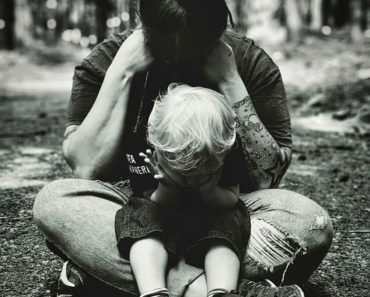Contents
- 1 Unveiling the Truth: Stepparent Dynamics in Couples Therapy
- 2 The Role of Couples Therapy in Stepparent Relationships
- 3 Addressing Co-parenting Issues in Couples Therapy for Stepparents
- 4 Healing and Building Stronger Bonds in Blended Families through Couples Therapy
- 4.1 How can couples therapy help stepparents navigate the unique challenges they face in their blended families?
- 4.2 What are some common issues that arise in couples therapy for stepparents, and how can therapists address them effectively?
- 4.3 How does couples therapy help stepparents establish trust, open communication, and healthy boundaries within their blended families?
- 4.4 Related Posts

Introducing our latest article on Stepparent Magazine: “What really happens in couples therapy”. Dive into the complex dynamics of blended families as we explore the transformative power of therapy for stepparents. Discover essential insights and effective strategies that can strengthen your relationship and foster a harmonious co-parenting environment. Join us on this enlightening journey towards building a stronger stepfamily bond.
Unveiling the Truth: Stepparent Dynamics in Couples Therapy
Unveiling the Truth: Stepparent Dynamics in Couples Therapy
In the complex world of stepparent dynamics, couples therapy plays a crucial role in unveiling the truth behind the challenges faced by stepfamilies. Stepparents often find themselves navigating through a maze of emotions and expectations, which can lead to conflicts within the couple and the family as a whole.
In this context, couples therapy provides a safe space for both partners to express their concerns, fears, and frustrations. It offers tools and strategies to improve communication and enhance the blended family’s functioning. By addressing the unique dynamics of stepparenting, therapists can help couples develop a deeper understanding of each other’s roles and responsibilities.
One of the key factors emphasized in couples therapy for stepparents is the need for realistic expectations. Unrealistic expectations are often a major source of conflict, as stepchildren may resist accepting a new parent figure or integrating into a new family structure. Therapists work with couples to set realistic goals and establish boundaries that consider the needs of all family members.
Another important aspect addressed in couples therapy is the challenge of divided loyalties. Stepparents may struggle with feelings of being caught between their partner and the stepchild. This can create tension and strain in the relationship. Through therapy, couples learn how to address these conflicts constructively and find a balance that supports both their romantic relationship and their roles as parents.
Moreover, couples therapy for stepparents encourages open and honest communication. Stepparents are encouraged to express their concerns while biological parents are encouraged to listen without defensiveness. This fosters a safe environment where everyone’s feelings and opinions are acknowledged and validated.
In conclusion, couples therapy is a valuable resource for stepparents navigating the complexities of blended families. It provides a platform for addressing the unique challenges and dynamics involved, helping couples develop healthy strategies for building strong, cohesive families. Through this process, the truth behind stepparent dynamics is unveiled, paving the way for greater understanding and harmony within the family unit.
The Role of Couples Therapy in Stepparent Relationships
Stepparenting can be a complex and challenging journey, as it involves blending two families with their own dynamics and histories. Couples therapy plays a vital role in helping stepparents navigate the unique challenges they face in their relationships. In therapy, they can learn effective communication techniques, build trust, and develop strategies to handle conflicts that may arise.
Addressing Co-parenting Issues in Couples Therapy for Stepparents
Co-parenting is an essential aspect of stepparenting, where the stepparent needs to establish a healthy relationship with their partner’s biological parent. Couples therapy provides a safe space for stepparents and their partners to discuss co-parenting issues, such as differences in parenting styles, discipline, and child custody arrangements. Therapists can facilitate productive discussions and help them find common ground for effective co-parenting.
Healing and Building Stronger Bonds in Blended Families through Couples Therapy
Blended families often face emotional challenges as they try to create a sense of unity and belonging among family members. Couples therapy can aid in healing past wounds, addressing unresolved conflicts from previous relationships, and building stronger bonds within the blended family. Therapists can guide the couple towards fostering a nurturing environment that promotes love, understanding, and acceptance among all family members.
Couples therapy can be extremely beneficial for stepparents as they navigate the unique challenges they face in their blended families.
Blended families often bring together individuals from different backgrounds, with different parenting styles, and sometimes unresolved emotional issues from previous relationships. This can create tension, conflict, and feelings of insecurity within the family dynamic. Couples therapy provides a safe space for stepparents to discuss these challenges openly and work towards solutions that are best for the entire family.
One of the primary benefits of couples therapy for stepparents is the opportunity to improve communication. By improving their ability to communicate effectively, stepparents can strengthen their relationship and establish a united front when it comes to parenting decisions. This can lead to a more harmonious and cohesive family unit.
Couples therapy also helps stepparents manage their expectations within the blended family. Stepparents often enter these relationships with their own set of assumptions and beliefs about what their role should be. Therapy can help them explore these expectations and align them with the reality of their situation. This process allows stepparents to set realistic goals for themselves and develop strategies to achieve them.
Therapy also offers a platform for addressing any unresolved emotional issues from previous relationships. Stepparents may carry baggage or experience difficulties in forming attachments with their stepchildren. By addressing and working through these emotions, stepparents can develop healthier and stronger relationships with their stepchildren.
Overall, couples therapy can help stepparents navigate the unique challenges they face in blended families by improving communication, managing expectations, and addressing unresolved emotional issues. With the guidance and support of a therapist, stepparents can foster healthier relationships within their blended families and create a more positive and nurturing environment for everyone involved.
What are some common issues that arise in couples therapy for stepparents, and how can therapists address them effectively?
In couples therapy for stepparents, there are several common issues that often arise. These may include:
1. Role confusion and boundaries: Stepparents may struggle with defining their role within the new family dynamic and establishing appropriate boundaries with stepchildren. This can result in tension and conflicts between stepparents and biological parents. Therapists can address this by facilitating open communication and negotiation of roles and boundaries. They can help stepparents and biological parents explore their expectations, clarify their roles, and develop strategies to handle conflicts effectively.
2. Child loyalty and divided loyalties: Children may experience loyalty conflicts between their biological parent and the stepparent. This can create emotional stress and strain the couple’s relationship. Therapists can help by creating a safe space for children to express their feelings and concerns. They can assist in fostering healthy communication channels between the child, stepparent, and biological parent to address and resolve these conflicts.
3. Co-parenting challenges: Navigating co-parenting relationships with ex-partners can be complex and trigger conflicts between stepparents and their partners. Therapists can support couples by helping them establish effective co-parenting strategies, such as clear communication, joint decision-making, and conflict resolution skills. They can also provide guidance on managing co-parenting boundaries and addressing any issues that may arise.
4. Resentment and frustration: Stepparents may feel overlooked, unappreciated, or excluded, especially if they face challenges in bonding with stepchildren or if the biological parent prioritizes their child over their partner. Therapists can address these feelings by providing a space for stepparents to discuss their emotions and concerns. They can help the couple improve communication, develop empathy, and find ways to balance the needs of all family members.
5. Blended family dynamics: Each blended family has its unique dynamics and challenges. Therapists can help stepparents navigate these complexities by facilitating discussions about family values, expectations, and goals. By addressing individual and family needs, therapists can assist in creating a sense of unity and cohesion within the blended family.
To effectively address these issues, therapists should create a safe and non-judgmental environment where all family members can express themselves freely. They should encourage active listening, empathy, and open communication. Additionally, therapists can use various therapeutic techniques such as family systems theory, cognitive-behavioral therapy, and narrative therapy to help stepparents and their partners overcome challenges and build stronger relationships within the blended family.
How does couples therapy help stepparents establish trust, open communication, and healthy boundaries within their blended families?
Couples therapy can be incredibly beneficial for stepparents in establishing trust, open communication, and healthy boundaries within their blended families.
Trust: Trust is an essential component of any successful relationship, and this is especially true in the context of blended families. Stepparents often face challenges in building trust with their stepchildren and even their partner. Couples therapy can provide a safe and supportive environment for addressing trust issues by facilitating honest and open conversations. The therapist can help the couple explore any underlying issues that may be hindering the development of trust and work towards rebuilding it.
Open communication: Effective communication is crucial in any relationship, but it becomes even more essential in blended families where multiple relationships and dynamics are at play. Couples therapy can aid stepparents in developing better communication skills to express their thoughts, concerns, and needs more effectively. The therapist can teach active listening techniques, conflict resolution strategies, and encourage the couple to validate each other’s perspectives. By improving communication, stepparents can establish stronger connections with their partners and stepchildren, fostering a healthier family dynamic.
Healthy boundaries: Blended families often struggle with establishing and maintaining healthy boundaries. Stepparents may feel unsure about their role or may have difficulty setting boundaries with stepchildren. Couples therapy provides a space for discussing and negotiating boundaries within the family unit. The therapist can guide the couple in identifying appropriate boundaries, addressing any conflicts that may arise, and helping them establish clear expectations for all family members. This process can promote a sense of stability, security, and respect within the blended family.
In summary, couples therapy offers stepparents the opportunity to address trust issues, improve communication skills, and establish healthy boundaries within their blended families. Through the guidance of a trained therapist, stepparents can navigate the complex dynamics, build stronger relationships, and create a more harmonious and fulfilling family life.
In conclusion, couples therapy can be an invaluable tool for stepparents navigating the complexities of their relationships. Through open communication, empathy, and a willingness to work together, stepparents can uncover underlying issues and find constructive solutions. The therapy process can provide a safe space for addressing challenges unique to blended families, such as role ambiguity and parenting conflicts. Ultimately, by actively participating in couples therapy, stepparents can foster stronger bonds, enhance family dynamics, and create a more harmonious and fulfilling home environment for everyone involved.







